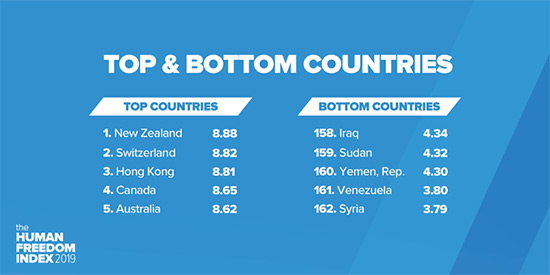Global freedom still in decline

Global freedom has continued its slight decline since 2008 according to the fifth annual Human Freedom Index (HFI), the most comprehensive measure of freedom ever created for a large number of countries around the globe. Notably, New Zealand tops the rankings this year, followed by Switzerland.
The index, co-published by the Cato Institute, the Fraser Institute in Canada, and the Liberales Institut at the Friedrich Naumann Foundation for Freedom in Germany, ranks 162 countries based on 76 distinct indicators of personal, civil, and economic freedom, using data from 2008 to 2017, the most recent year for which sufficient data are available.
The index captures the degree to which people are free to enjoy important rights such as freedom of speech, religion, association, and assembly, and also measures freedom of movement, women’s freedoms, crime and violence, and legal discrimination against same-sex relationships.
Selected countries rank as follows: Finland and Germany (tied in 8th place), Sweden (11), United Kingdom (14), Estonia and the United States (15), Taiwan (19), Japan (25), South Korea (27), Chile (28), France (33), Poland (40), South Africa (64), Argentina (77), Kenya (79), Mexico (92), India (94), Brazil (109), Russia (114), Turkey (122), Saudi Arabia (149), Iran (154) and Egypt (157). The freest country in the region is Switzerland (ranked 2nd globally), followed by Denmark and Luxembourg (tied for 6), and Finland and Germany (tied for 8). The least free country in the region is France (33), preceded by Italy (32), Spain (29), and Portugal (26).
Some 61 countries increased their overall freedom ratings from 2008 to 2017, while 79 countries decreased their freedom ratings. ”With the rise of populism, nationalism, and hybrid forms of authoritarianism, people’s rights and freedoms are under assault in many corners of the globe. Because of their inherent value and their contribution to well-being, those freedoms deserve the strongest defense,” said Por?nik.
Around 16 percent of the world’s population lives in the top quartile of nations in the index, while 35 percent lives in the bottom quartile of countries that have the lowest levels of freedom.
The authors also find that of the 12 major categories that make up the index, all but five have seen some deterioration. Religion, Identity and Relationships, and Rule of Law saw the largest decreases since 2008, while Sound Money saw the largest improvement.
Countries that have high personal freedom tend to exhibit high economic freedom. The freest countries in the world by quartile enjoy much greater income per person ($40,171) compared to those in the least-free quartile ($15,721). In addition, the authors find a strong correlation between human freedom and democracy, with Hong Kong as an outlier in this regard. “The evidence shows the importance of freedom in all its dimensions and how economic and personal freedom go hand in hand,” noted Vasquez.
The 2019 Human Freedom Index is co-authored by Ian Vásquez, director of the Cato Institute’s Center for Global Liberty and Prosperity, and Tanja Por?nik, a Cato Institute adjunct scholar and Fraser Institute senior fellow. Fred McMahon, resident fellow and Dr. Michael A. Walker Research Chair in Economic Freedom at the Fraser Institute in Canada, serves as Project Editor.
Tanja Porcnik is a Senior Fellow at Fraser Institute, Adjunct Scholar at Cato Institute and coauthor of The Human Freedom Index.